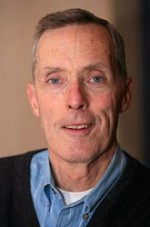It was more than a quarter-century ago that I found myself sitting in the office of the archbishop of Omaha, Nebraska. It was the third day on the job as editor of the archdiocesan newspaper after some two decades in the secular press.
I had written my first editorial in the new position and had sent it over to the chancery with a note to Archbishop Daniel E. Sheehan for his review, with the further suggestion that we discuss editorial philosophy.
“This is fine,” he said, sliding the draft over his desk. “Now, you want to discuss editorial philosophy?”
I nodded, settling down for what should have been at least a two-hour conference.
[hotblock]
“Well, we hired an editor to run the paper,” he said.
“The only thing is: We do not criticize the pope. Can you live with that?” Archbishop Sheehan asked.
“Of course,” I said.
“Then have a good day,” he said, returning to some document on his desk.
That was the first and last editorial he saw prior to publication for the next 10 years. It set the tone for writing commentary and expressing opinion in the Catholic press. My appreciation increased as I came to learn from fellow editors in Catholic press who did not enjoy such freedom.
After retiring as editor of the Catholic Northwest Progress in Seattle, I was fortunate to be asked by Catholic News Service to continue writing a weekly column on current events.
This is the last of them.
After eight years of weekly deadlines, it’s time to fully embrace retirement. Many authors have written fine books. It’s time for me to read some of them. It’s time, as well, to increase the humility that can only come from more time on the golf course.
When my son said a few months back, “There’s finally a pope that agrees with you,” it seemed to be a validation of the decision.
There are indelible memories, of meeting and shaking hands with a pope — now a saint — during an audience at the Vatican, of being in a sacristy of a church in Guatemala as the priest pointed out a bullet hole in a cabinet door made during the murder of the pastor whose views on liberation of people was not appreciated by the government, of being awed by the dedication and faith of those inspired by Catholic social teaching who worked in the favelas of Rio de Janeiro, the slums of Jamaica and subhuman conditions of Haiti.
It takes a bit of chutzpah to put out opinions week after week and know they are read by thousands. The goal has not been to convince. It has been to raise questions, to hold up things and for events to be evaluated in light of the principles we Catholics believe. Thus, the “Consider This” title.
Some of the most critical times for the church coincided with the time of this column. The sexual abuse of children and subsequent cover-up of the offenses did much to stain the reputation of the church as a viable speaker in the public agenda.
Suddenly, things are changing.
What was eagerly anticipated in the wake of the Second Vatican Council 50 years ago may now finally be coming to pass.
“I believe in the surprises of the Holy Spirit,” the late Cardinal Leo Jozef Suenens, a major voice at Vatican II, later wrote in his book titled “A New Pentecost?”
At this line of demarcation, of past and future, the book title no longer needs the question mark.
***
Kent is the retired editor of archdiocesan newspapers in Omaha and Seattle. He can be contacted at: considersk@gmail.com.
PREVIOUS: Dear Brittany: Our lives are worth living, even with brain cancer
NEXT: Father Tolton, pray for us




Share this story